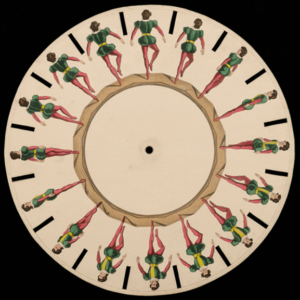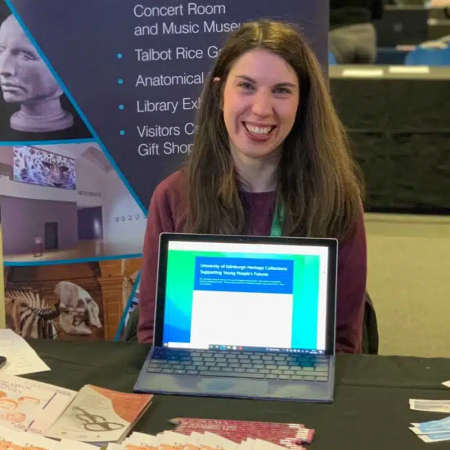We are delighted to share our second blog in our PhD Horizons 2024 series from Laura Beattie. Laura graduated from the University of Edinburgh with a PhD in English Literature in 2018 and currently works as the Engagement Officer (Communities) for the University of Edinburgh’s Heritage Collections department.
Many thanks to Laura who reflects on how the skills she gained from her PhD have equipped her for a rewarding career outside of academia and gives some excellent advice to current PhD students…
Hi Laura, can you tell us about your current role and what it involves?
I currently work as the Engagement Officer (Communities) for the University of Edinburgh’s Heritage Collections department. As a department, we look after the university’s archives and museum objects which includes everything from rare books to a world-class musical instrument collection to an art collection that’s over 400 years old.
More specifically, my role is to engage underserved communities with our collections for the purposes of creating positive social impact. At the moment, my focus is on two key areas: working with young people from widening participation backgrounds via Arts Award programmes and delivering learning programmes in prisons.
What led you to work outside of academia?
I completed my PhD in English Literature at the end of 2018. Although I really enjoyed doing it, and in many ways it felt like a real luxury to have spent three (nearly four) years working on my thesis, I decided not to pursue a career in academia because I didn’t want to commit myself to working on only one specific subject area (or to working 50+ hours a week which seems to be the case for most academics!). Something that I really enjoy about my job now is that one week I can be running a session on the legacies of Dolly the Sheep based on the Roslin Institute archives and the next week working with a group to create their own phantasmascopes, one of the first forms of visual animation, examples of which we hold in our rare books collection.

In what ways are you applying the skills you gained from your PhD?
There are many skills I think I’ve carried forward from my PhD. Some of these come from the writing of the thesis itself: the ability to research subjects previously unknown to me, synthesise a large amount of information and deliver it in a digestible format. Or the capacity to zoom out and look at the ‘bigger picture’ of a project, while also being able to pay attention to smaller details. Other skills come from some of the many fantastic extracurricular opportunities I was given while a PhD student: the teaching experience that I gained while a tutor in the third year of my PhD for first year undergraduate students was particularly valuable (the English Literature department try to give all third year PhD students experience of teaching pre-Honours undergraduates). As was collaborating with other students to run, for example, a week-long writing workshop which gave me experience in teamwork and organisation, as well as applying for funding which is another activity I undertake in my current role.
Are there any particular insights or advice Laura, that you would like to share with current PhD students considering a career outside of academia?
- Don’t be afraid to try different things out alongside your PhD: in the second year of our studies, a fellow PhD student and I ran an impact project based on holding creative writing workshops with refugees and asylum seekers. Although not directly related to my thesis, this project not only made me realise that I liked this type of work and gave me the idea for pursuing it in future but also gave me experience when applying for jobs after graduating.
- I also found attending events like the PhD Horizons conference and other career focused events offered by the University and the Scottish Graduate School for Arts and Humanities really useful in making me aware of what other career options were out there.
- A lot of my colleagues have PhDs (it’s common in the museums, libraries and heritage sectors generally) and I think many of them would agree that there’s lots of really interesting, stimulating and satisfying work to be found outside of academia.
Thanks Laura.
If Laura’s blog has inspired you to explore your post-PhD career options, there’s still time to register for our one-day conference, PhD Horizons: Career insights for PhD students, on Wednesday 19th June 2024. You can view the PhD Horizons event guide to find out more about the sessions, their great speakers and how to register.
Did you know that you can receive new blog post alerts? Sign up today to get email alerts sent straight to your inbox at: https://blogs.ed.ac.uk/careersinformed/


